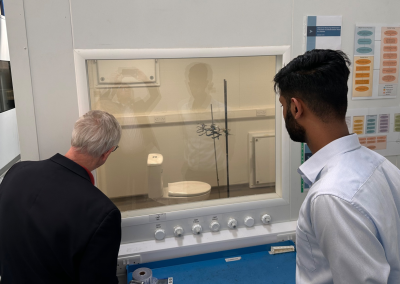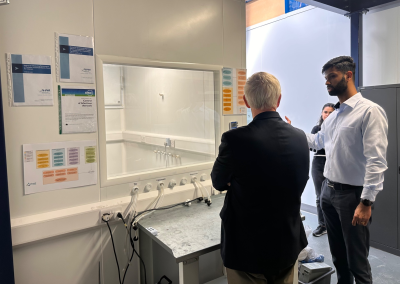Measles is a highly contagious disease, but improving indoor air quality through ventilation, filtration, and humidity control can significantly reduce its airborne transmission
Measles is a highly contagious viral disease caused by the measles virus, a single-stranded, negative-sense RNA virus. It belongs to the genus Morbillivirus within the Paramyxoviridae family. The virus primarily spreads through airborne respiratory droplets when an infected person coughs or sneezes. Because the measles virus can remain viable in the air or on surfaces for up to two hours, transmission is extremely efficient, even in enclosed spaces where ventilation is poor.
One of the most infectious diseases known to humans, measles has a basic reproduction number (R₀) ranging from 12 to 18, meaning a single infected person can spread it to 12–18 others in a susceptible population.

What are the disease characteristics?
Once inside the body, the measles virus incubates for 7 to 14 days, typically without symptoms. Initial symptoms include high fever, cough, runny nose, and conjunctivitis (red, watery eyes). Koplik’s spots, bluish-gray particles on an erythematous base, occur on buccal mucosa approximately 48 hours prior to the characteristic skin rash. These early signs are followed by the hallmark maculopapular skin rash, which usually starts on the face and spreads downward.
Complications can be serious or even fatal, particularly in young children, pregnant women, and immunocompromised individuals. These include:
- Pneumonia (the most common cause of measles-related death)
- Encephalitis (brain swelling)
- Severe diarrhoea and dehydration
- Ear infections, which may lead to hearing loss
Despite being preventable, measles still causes over 100,000 deaths worldwide annually, predominantly in regions with low vaccination rates.
How can you prevent measles?
 The cornerstone of measles prevention is the Measles, Mumps, and Rubella (MMR) vaccine. It is safe, effective, and usually administered in two doses:
The cornerstone of measles prevention is the Measles, Mumps, and Rubella (MMR) vaccine. It is safe, effective, and usually administered in two doses:
- First dose: 12–15 months of age
- Second dose: 4–6 years of age
Achieving 95% vaccination coverage is critical for herd immunity, which protects those who cannot be vaccinated, such as infants and people with certain medical conditions.
Additional public health measures include:
- Rapid identification and isolation of suspected cases
- Contact tracing
- Travel advisories and immunization requirements for international travellers
- Community outreach to counter misinformation about vaccines
How can Indoor Air Quality Measures reduce the transmission?
Because measles is airborne, managing indoor air quality (IAQ) plays a significant role in reducing transmission risk, especially in crowded settings like schools, hospitals, offices and public transport.
The key IAQ measures include:
- Ventilation: Increasing fresh air intake dilutes airborne virus concentrations.
- High-efficiency particulate air (HEPA) filtration: Effective at capturing virus-laden particles.
- Air purification technologies, such as UV-C light and ionization systems.
- Humidity control: Maintaining relative humidity between 40–60% may reduce viral survival.
- Regular cleaning and surface disinfection, especially in high-contact areas.
Improving indoor air quality isn’t just a short-term pandemic solution, but a long-term strategy to reduce the spread of many respiratory illnesses, including measles.
Airmid Healthgroup: Expertise in Indoor Air Quality
Airmid Healthgroup is a globally recognized authority on indoor air quality (IAQ), biomedical testing, and environmental health. We offer cutting-edge testing and certification services to evaluate the performance of air purifiers, HVAC systems, building materials, and cleaning products.
Our work is particularly relevant in the fight against airborne diseases like measles, where understanding and optimizing IAQ can significantly impact transmission rates. With a team of virologists, microbiologists, and environmental scientists, Airmid Healthgroup provides scientifically validated insights that help manufacturers, building managers, and policymakers ensure healthier indoor environments.
By bridging the gap between health science and air quality technology, Airmid Healthgroup supports the development of spaces that are not only comfortable, but resilient against infectious diseases.
Are you a manufacturer looking to certify your air cleaning technology?
Related Tests
Related Blogs
https://airmidhealthgroup.com/faq-iso-157142019-what-you-need-to-know-about-bioaerosol-efficacy-testing-for-air-treatment-devices.html
Measles, vaccine, MMR, ventilation, HEPA, air filtration, air filters, HVAC, testing, validation, standards, particles, viruses, indoor air quality, , filtration, humidifier




